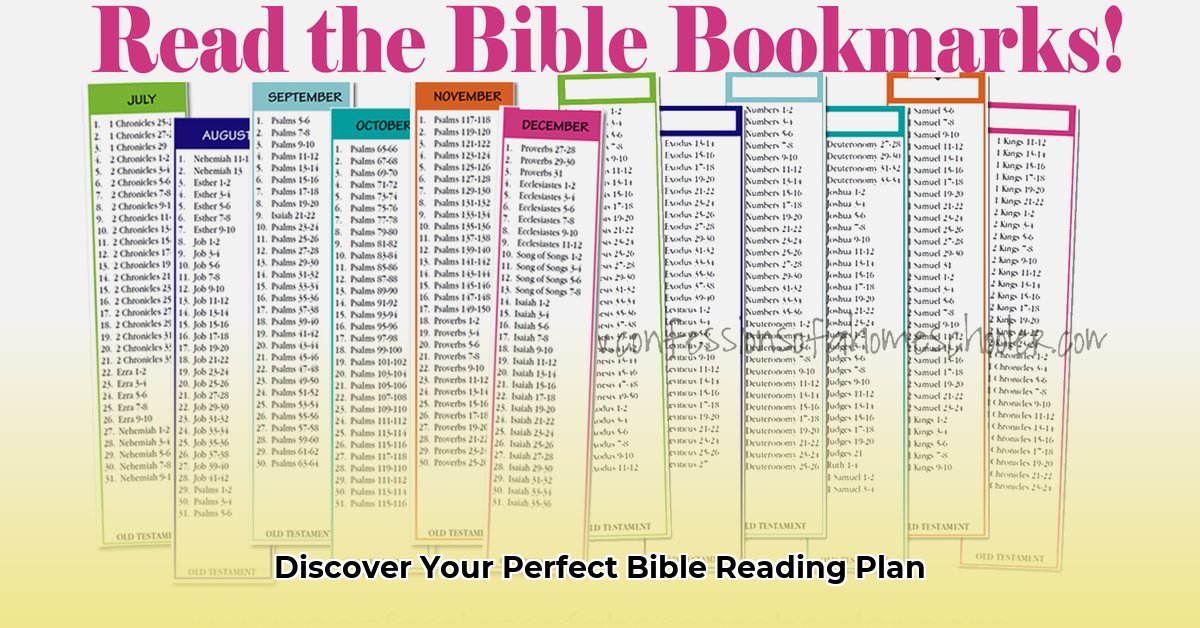
Want to deepen your relationship with God through consistent Bible reading? Choosing the right reading plan can make all the difference. This guide helps you navigate the many options, finding a plan that fits your unique needs and goals, whether you're a seasoned reader or just beginning your journey. We'll explore various plan types, assess your personal reading style, and offer practical recommendations to ensure you find a plan that fosters spiritual growth and lasting engagement. For additional guidance on reading order, check out this helpful resource on Bible reading order.
Understanding Your Bible Reading Style and Goals
Before selecting a plan, consider your personal preferences and aspirations. Are you a beginner needing a simple, manageable approach, or an experienced reader looking for in-depth study? Do you prefer a structured schedule, or more flexibility? Understanding your learning style – visual, auditory, or kinesthetic – enhances your engagement with the text. Knowing your spiritual goals—seeking a better understanding of God’s character, growing in specific virtues (like compassion), or deepening your faith are all valid goals. A clear understanding of your goals helps tailor your choice to your needs. Did you know that studies show consistent Bible reading significantly improves spiritual well-being?
Types of Bible Reading Plans: A Quick Overview
Several approaches cater to diverse preferences and schedules. Each offers unique benefits and challenges. Let's examine some popular options:
Chronological Plans: These follow the Bible's historical timeline, offering a narrative flow. You experience the unfolding story, but it might involve switching between books frequently, potentially disrupting the immersive experience.
Thematic Plans: Focusing on specific topics (e.g., grace, faith, forgiveness), thematic plans offer deep dives into particular themes. This approach provides concentrated study, building a thorough understanding of each theme. It can, however, sometimes lack the big picture of the entire narrative.
One-Year Plans: These aim to cover the entire Bible in 365 days. The comprehensive coverage is beneficial, but the daily readings can be extensive, making consistency challenging for some, especially those with busy schedules.
Shorter Plans (e.g., 3-month plans): These shorter options are ideal for beginners or those with limited time. They offer manageable readings, building confidence and routine without feeling overwhelming. However, they cover less ground compared to longer plans.
Inductive Bible Study Plans: These plans focus on observation, interpretation, and application of the text through careful study, allowing for deeply personal and insightful engagement. They are great for in-depth understanding but demand more time and effort than other plans.
Top Recommended Bible Reading Plans: A Curated Selection
Selecting the "best" plan is highly individual. Here's a curated list categorized for clarity:
| Plan Name (Example) | Plan Type | Time Commitment | Strengths | Weaknesses | Target Audience |
|---|---|---|---|---|---|
| The Chronological Bible | Chronological | Varies | Immersive narrative experience; strong historical context. | Can feel disjointed, requiring frequent book changes. | Beginners and Experienced Readers seeking historical context |
| NIV One-Year Bible | One-Year | Daily | Comprehensive coverage; establishes consistent reading habit. | Can be demanding; requires significant daily commitment. | Experienced Readers with consistent time availability. |
| A 3-Month Topical Plan (Example) | Thematic | Daily/Weekly | Focused study; builds expertise in specific theological areas. | Can lack broad biblical context; requires intentional planning. | Beginner & Experienced Readers focused on specific areas. |
Note: This table offers sample plan categories. Specific plan names and availability will change frequently. Consult reputable online resources for updated listings. Many Bible apps (like YouVersion) offer numerous plans.
Choosing Your Perfect Plan: A Self-Assessment Guide
This self-assessment helps you focus your search:
Time Commitment: How much time can you realistically dedicate each day or week? Be honest – consistency is crucial.
Reading Style: Do you prefer shorter, focused readings, or longer, immersive sessions?
Spiritual Goals: What's your aim? Broad understanding? Deeper study of specific themes? Spiritual growth in a particular area?
Learning Style: Do you prefer a highly structured plan or a more adaptable approach?
Resources: Do you prefer physical Bibles, digital apps, or online resources?
Your Journey Begins Now!
The most effective plan is the one you'll stick with. Experiment! Find the approach that inspires and sustains your engagement with God's Word. Even short, consistent sessions foster spiritual growth beyond what you might expect. Begin your journey today and experience the transformative power of regular engagement with the Bible.